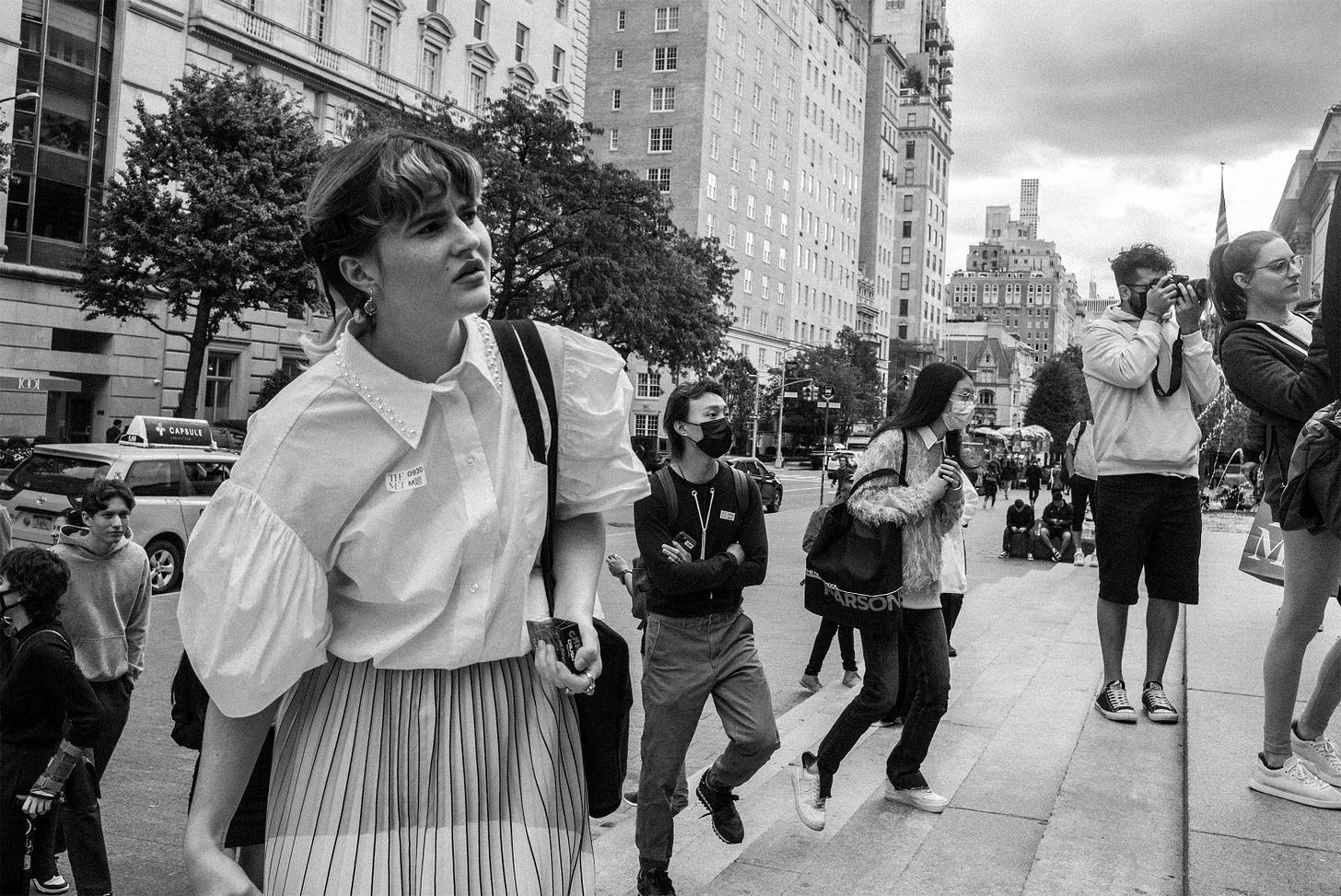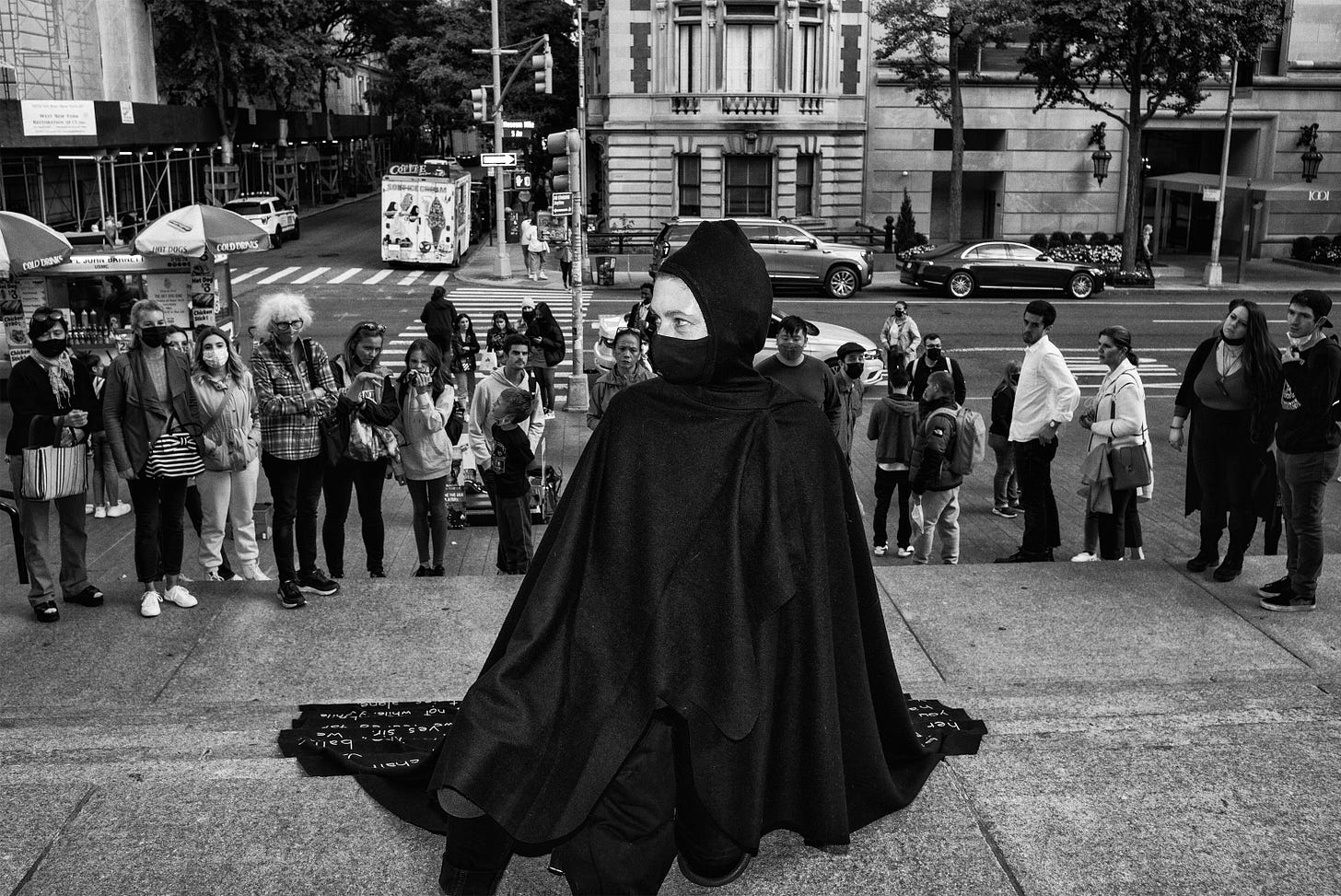September 30th, Metropolitan Museum of Art, 1000 5th Avenue, N.Y., N.Y. from 3:00 - 5:00 pm.
Photographs by Reuben Radding
Honky-tonk notes were spilling out from a street saxophonist playing in front of the museum. He had daredevil energy, and his up-and-down-from-way-back improv would flow in and out of my consciousness as I knelt on the steps. The sharp pitch and low roll of his music helped me gather my chutzpah, and yet, at times, it would also mimic the constricting tension in my chest as security guards pressured me, repeatedly, to move. Meanwhile, passing museum-goers gave me intermittent relief, and dare I say, hope, as they came to read my cape. Despite New Yorkers known toughness, I felt a genuine and deep kindness from many of them.
When I had lived in New York in 1991, I visited the Met every week to learn as much as I could about painting. Being a waitress at a Mafia-run Italian restaurant, I could barely pay the rent for the SRO I was living in, so I treasured that donation-based entry fee at the door. I studied how the Italian masters used chiaroscuro to create dramatic effect, felt the joy in the Fauvists use of saturated color, and sensed the melancholia of the Fountainebleu School. Though I had visited the Met to look at pictures, more often, I was struck by them. Some images had made me gasp or lifted me onto my toes. I could stand looking, and looking, and I’d often felt deeply humbled before them.
As I was setting up on the steps at 3:00, I was remembering those experiences. I watched others going into the museum and I imagined they, too, were visiting the museum to feel that same aliveness in seeing art, to be moved, and maybe, even haunted by art. I put on my knee pads, unfolded my cape and laid it down. I couldn’t imagine spreading my cape anywhere other than on the stairs of the museum. The idea of it stuck to me like tiny, floating feathers clinging to honey.
Within a very short time, a woman crouched down next to me, and slipped a twenty-dollar bill under the front of my shoe, saying, “Here’s a bit of support.” Just like that. Her gesture made me feel awkward, and I felt my body tighten; suddenly I wanted to hide. Yet, I also knew she was being kind. I thanked her.
In the next moment, I saw a composed looking security guard descending the stairs, gliding down as if he were on Solomon’s carpet. He went all the way around and stood behind me. Less than a minute later, he came up close to my face, and asked, “Is this story true? I said yes. He cast his head down for a moment, then, looked straight into my eyes. “We don’t allow anyone on the steps.” He picked up the twenty-dollar bill, “Please put that away, we don’t allow any solicitation either.” Though his words were firm, I felt a sincerity and grace from his countenance. While walking away, he said, “We’ll see if you can stay for a bit.”
So now I was here, and I was going to stay. Maybe. More people approached me and said dear things to me, but mostly they connected to me with their eyes and hands. A young woman told me she was an aspiring writer and gave me a picture of a Chagall painting. It was apparent she had ripped it out of a book. I could see a bit of angst and longing in her face. She told me she wanted to make “real good work”-- you know, the kind that gives others pause and reflection. As I looked at her, I remembered my own youngish self, full of the future, full of ideas. For an instant, I felt a tender nostalgia for that twenty-two-year-old being. Then, with a heartfelt gesture, she said, “I’m really touched by this,” and in a softer voice, “I’m kind of floored.”
As time went on, a crowd gathered, and the security team became more and more concerned about my presence. A supervisor came down, and told me I’d have to move to the sidewalk.
I said, “Would you please read my cape?”
“No.” she said.
I asked her again. “Please read my cape.”
She stood for a few moments looking at me, then, she walked behind me.
When she came back, her face had softened, but she requested again that I move off of the steps.
I told her, “I can’t.”
She insisted again.
I repeated, “I can’t.”
She asked me one more time, “We can’t allow you to be on the stairs. She demanded in a louder tone, “Will you move to the sidewalk please?!”
I sighed, and lowered my head. “I can’t.”
As she walked away, I felt panicked she might call the police. The sound of the saxophone was still going, a ricochet to my heart-pounding fear. Traffic sounds blended with the music, and in between, other passersby offered their care with words of deep gratitude. One man said to me, “I know about this too. You’re not alone.”
I was torn between my own panic and the precious space of union I was having with the public. As I looked at the entrance, seeing the people coming and going, I thought how they all had their own stories; histories held by their bodies, colliding, touching, mixing into each other. They were talking, walking tales. Mine was stretched out behind me, but that narrative of grief wasn’t the entirety of me. Dozens of people would thank me and wish me well, and it felt plain good to connect with each one of them.
Time passed. Another security guard came out, presumably of higher rank, and he instructed me to move to the side of the steps. He mentioned that “lawyers” were not happy about the situation. Again, I refused. He went behind me and read the words on my cape. Then he returned, and his face held much emotion. He said, “You’re not that close to the entrance of the building, but if there’s an emergency, and people need to rush out, you may get injured.”
I looked at him, and said, “I’m willing to take the risk.”
“Okay,” and he went back inside.
A wave of relief and gratitude came over me; my shoulders descended. By this time, the saxophonist was gone, but his improvisation still reverberated within me, reminding me of all the many artists making their way, doing their best to create something in the world--for the world. My stubbornness and determination were real; I was going to stay for my committed time. The Metropolitan had given up on moving me. I couldn’t imagine disrupting the connection of hope and love I was having with New Yorkers. Perhaps it was this that had kept me here all along.











beautiful, thank you